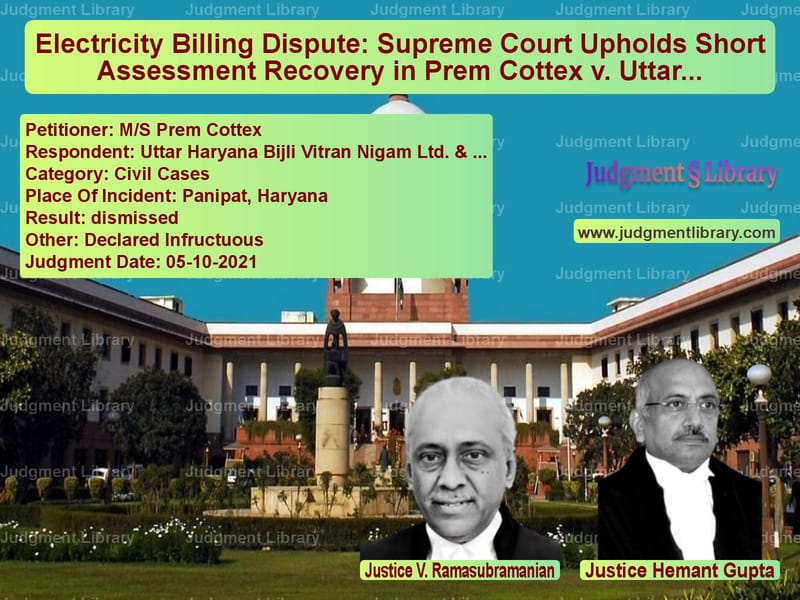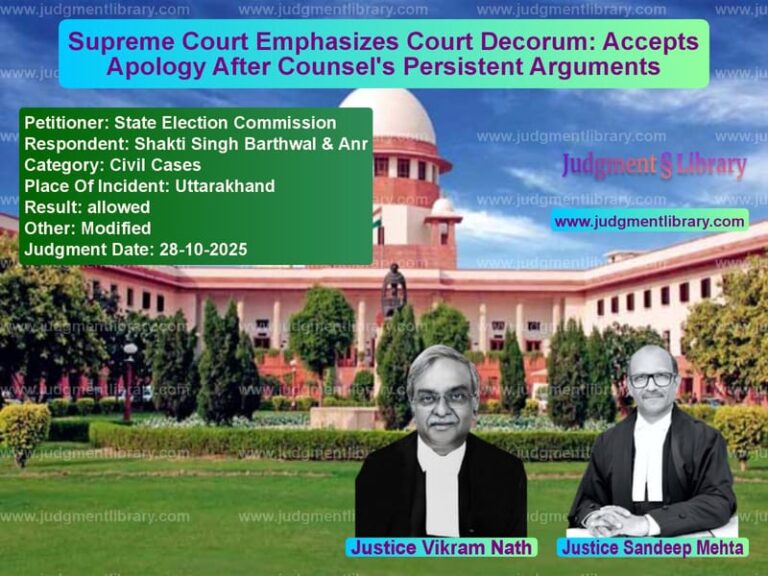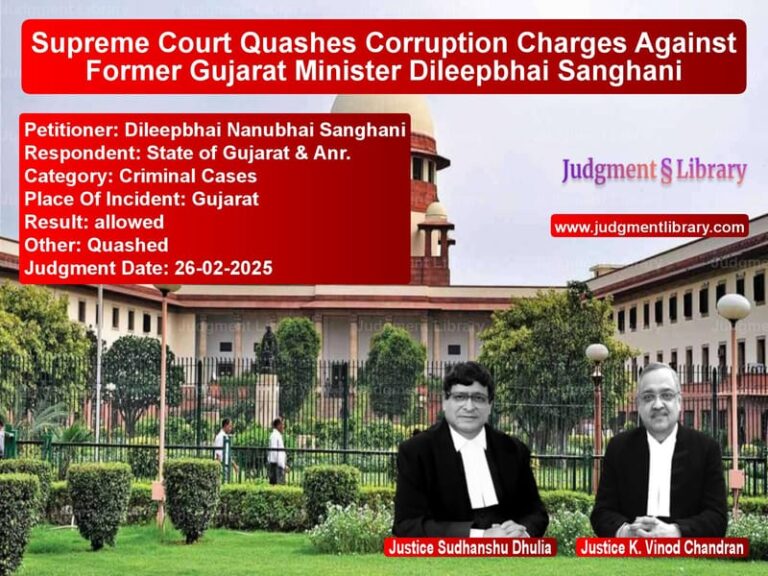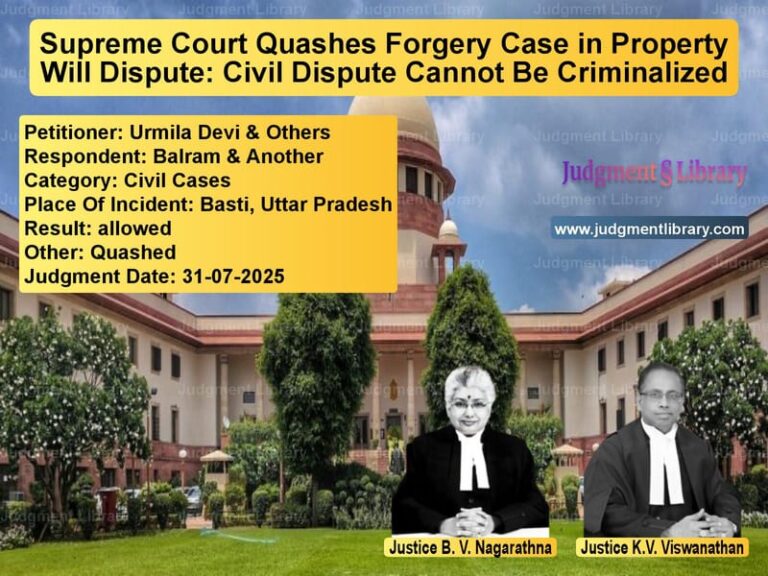Electricity Billing Dispute: Supreme Court Upholds Short Assessment Recovery in Prem Cottex v. Uttar Haryana Bijli Vitran Nigam Ltd.
The Supreme Court of India recently adjudicated upon a significant case in the domain of electricity billing disputes: M/S Prem Cottex v. Uttar Haryana Bijli Vitran Nigam Ltd.. The Court ruled in favor of the electricity distribution company (licensee), allowing them to recover unpaid electricity charges under a short assessment notice. The judgment clarifies the interpretation of Section 56 of the Electricity Act, 2003, particularly regarding the limitation period for recovering past electricity dues.
Background of the Case
The appellant, M/S Prem Cottex, a cotton yarn manufacturer in Panipat, Haryana, had an electricity connection from the respondent Uttar Haryana Bijli Vitran Nigam Ltd. (UHBVNL). Initially, the company’s sanctioned load was 404.517 KW, which was later extended to 765 KW with a contract demand increase from 449 KVA to 850 KVA in August 2006.
Three years later, in September 2009, UHBVNL issued a short assessment notice to Prem Cottex, demanding an additional payment of Rs. 1,35,06,585/-. The notice stated that there had been an incorrect multiplication factor (MF) of 5 applied in electricity billing instead of the correct MF of 10 for the period between August 2006 and September 2009. The company was directed to pay the outstanding amount, failing which necessary action would be taken.
Legal Issues Considered
- Whether the electricity company’s demand for recovery of short-assessed charges was valid.
- Whether the two-year limitation period under Section 56(2) of the Electricity Act, 2003 barred the recovery.
- Whether the National Consumer Disputes Redressal Commission (NCDRC) had erred in dismissing the consumer complaint.
- Whether negligence on the part of the electricity company in applying an incorrect multiplication factor could absolve the consumer from paying the due charges.
Petitioner’s (Prem Cottex) Arguments
The appellant, Prem Cottex, challenged the short assessment notice on the following grounds:
- The demand was raised three years after the alleged underbilling started, violating the two-year limitation period prescribed under Section 56(2) of the Electricity Act.
- The error in applying the incorrect multiplication factor was due to the negligence of the electricity company, and the consumer should not suffer due to the company’s mistake.
- Section 56(2) explicitly states that any sum due from a consumer cannot be recovered after two years from when it first became due.
- Prem Cottex had already charged its customers based on the bills received and could not now recover additional costs retroactively.
Respondent’s (Uttar Haryana Bijli Vitran Nigam Ltd.) Arguments
The electricity company countered these arguments with the following points:
- The demand was not for an unbilled period but for rectification of an incorrect bill due to a clerical error.
- The limitation period under Section 56(2) applies only when a bill is not raised, not when an erroneous bill is corrected.
- The consumer was legally liable to pay for the actual energy consumed, regardless of whether the error was detected late.
- The National Commission had rightly held that this was a case of escaped assessment and not deficiency in service.
Supreme Court’s Observations
On the Applicability of Section 56(2)
The Court clarified that Section 56(2) only bars the disconnection of supply for non-payment of amounts due beyond two years but does not prohibit the recovery of unpaid amounts. The Court held:
“The period of limitation of two years would commence from the date on which the electricity charges became first due under Section 56(2) of the Act.”
On the Responsibility for Billing Errors
The Supreme Court observed that the consumer had benefited from underbilling for three years and could not claim unfairness when asked to pay the correct amount:
“The consumer had enjoyed the supply of electricity and consumed it. The company is entitled to recover the correct charges as per the actual consumption.”
On the Role of Consumer Forums
The Court held that consumer forums cannot entertain cases where the dispute arises from a bona fide correction of billing errors:
“A short assessment notice due to an error in applying the multiplication factor is not a deficiency in service.”
On the Consumer’s Obligation to Pay
The Court rejected the argument that the appellant should not be liable because they had already passed on the cost to customers:
“Every consumer is responsible for paying the correct charges for the energy consumed, regardless of whether they were incorrectly charged earlier.”
Final Judgment
The Supreme Court ruled:
- The National Consumer Commission was right in dismissing the consumer complaint.
- The short assessment notice issued by the electricity company was valid.
- The appellant was liable to pay the pending amount.
- The balance amount must be paid within eight weeks.
Significance of the Judgment
- Clarifies the Scope of Section 56(2): Confirms that limitation applies only to disconnection, not to recovery.
- Protects Electricity Companies: Ensures that distribution companies can recover undercharged amounts due to genuine errors.
- Encourages Accuracy in Billing: Highlights the importance of applying correct billing factors.
- Limits Scope of Consumer Disputes: Consumer forums cannot interfere in bona fide corrections of billing errors.
Conclusion
The Supreme Court’s decision in Prem Cottex v. Uttar Haryana Bijli Vitran Nigam Ltd. is a landmark ruling on electricity billing disputes. It affirms that consumers must pay the correct amount for energy consumed, even if billing errors are detected years later. By allowing utilities to recover unpaid amounts, the Court has ensured fairness and financial stability for electricity providers while clarifying the limitation period under Section 56(2) of the Electricity Act.
Petitioner Name: M/S Prem Cottex.Respondent Name: Uttar Haryana Bijli Vitran Nigam Ltd. & Ors..Judgment By: Justice V. Ramasubramanian, Justice Hemant Gupta.Place Of Incident: Panipat, Haryana.Judgment Date: 05-10-2021.
Don’t miss out on the full details! Download the complete judgment in PDF format below and gain valuable insights instantly!
Download Judgment: ms-prem-cottex-vs-uttar-haryana-bijli-supreme-court-of-india-judgment-dated-05-10-2021.pdf
Directly Download Judgment: Directly download this Judgment
See all petitions in Consumer Rights
See all petitions in Damages and Compensation
See all petitions in Judgment by V. Ramasubramanian
See all petitions in Judgment by Hemant Gupta
See all petitions in dismissed
See all petitions in Declared Infructuous
See all petitions in supreme court of India judgments October 2021
See all petitions in 2021 judgments
See all posts in Civil Cases Category
See all allowed petitions in Civil Cases Category
See all Dismissed petitions in Civil Cases Category
See all partially allowed petitions in Civil Cases Category







